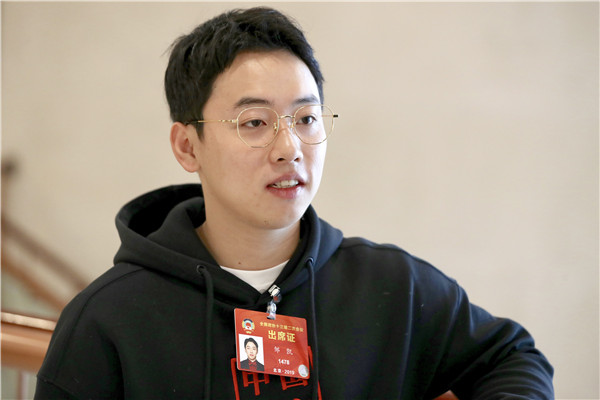Using influence to promote gymnastics
 0 Comment(s)
0 Comment(s) Print
Print E-mail China Daily, March 6, 2019
E-mail China Daily, March 6, 2019
Political adviser Zou Kai will welcome a baby soon. Although the former Olympic gymnastics champion has not decided whether to encourage his child to become a professional gymnast on the world stage, he knows what he has to do now - to promote the sport among more children as a member of the 13th National Committee of the Chinese People's Political Consultative Conference.

"As a CPPCC member, we carried out research based on our own work," said the 31-year-old, who is now deputy dean of the gymnastics department at Sichuan Sports College and deputy director of the Sichuan gymnastics administrative center.
"I'm now working to combine basic gymnastics training with education at kindergartens and schools."
A native of Luzhou, one of the two port cities in inland Sichuan province, Zou started learning gymnastics at the age of three in his hometown. In 2002, he was selected for the Chinese National Gymnastics Team, where he became a leading gymnast. Excelling in freestyle gymnastics and horizontal bar, Zou contributed to the team's gold medal performance at the Beijing Olympic Games in 2008 and also won individual gold medals in floor exercise and horizontal bar.
At the London Olympic Games in 2012, he led the team to win gold and successfully defended his Olympic title for floor exercise - becoming the second gymnast to do so in the men's floor exercise following former Soviet gymnast Nikolai Andrianov, who won the event in 1972 and 1976. With a total of five Olympic gold medals, Zou holds the record for most gold medals won by a male Chinese athlete in Olympic history.
Zou retired from the national gymnastics team in December 2016, and became a deputy dean of the gymnastics department at Sichuan Sports College the following year.
His daily routine is to oversee management of the department, and also be a referee in gymnastics competitions held in college. He also visits different parts of Sichuan to promote gymnastics in kindergartens and primary schools.
"I use my influence to persuade the heads of kindergartens and primary schools to let children learn gymnastics while they play," Zou said.
Through his efforts, a gymnastics competition for children ages 4 to 6 was held in Sichuan last year, attracting about 1,000 participants from 54 kindergartens.
Nowadays, the reserves of would-be sports stars in many competitive sports events are decreasing. Zou said that promoting gymnastics in kindergartens and primary schools can broaden the country's selection of good athletes for these events.
Thanks to rising living standards, an increasing number of people nationwide realize the importance of exercise, and there have been more sports facilities made available to them.
"Many institutions of higher learning in Sichuan open their sports facilities to the public. Our college also opens some facilities like the swimming pool at fixed times. Because so many people want to use the facilities, I sometimes cannot find space to park my car," Zou said.
During the Spring Festival this year, Zou stayed in Luzhou, which he calls a third-tier city, for four days, and was impressed with the decent sports facilities such as football fields and basketball courts in some residential quarters.
He said that having a large number of people able to participate in the national fitness program is conducive to the development of competitive sports.





